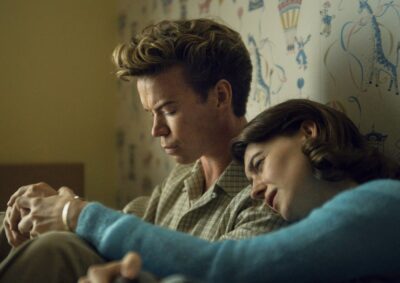Movie Review: ‘On Swift Horses’ is a fumbled queer tale set against atomic blasts
By Canadian Press on April 23, 2025.

Muriel, a waitress in 1950s America, seems to be the quintessential June Cleaver. She’s got a loving husband, a suburban house with a white picket fence in California and nice outfits. But not everything is as it seems, like her secret gambling. And her eye for a neighbor.
“On Swift Horses,” based on Shannon Pufahl’s novel of the same name and adapted by Bryce Kass, is all about how a dominant culture can suppress natural impulses. More specifically, it’s a queer tale set against the post-Korean War status quo.
“We are all just a hair’s breadth from losing everything, all the time,” Muriel is told by a woman also hiding her truth in plain sight.
But despite a brilliant performance by Daisy Edgar-Jones, “On Swift Horses” gets lost in a meandering plot and clunky symbols, including olives, atomic bomb tests, a tiny gun and a horse, the universal sign of the unbridled self that is just sort of dumped here. The execution is often slack and then veers into melodrama in the last 15 minutes. And there’s a weird noir vibe that doesn’t really work.
That’s a shame because a film dealing with hidden homosexuality is very relevant as some forces seem to seek to return America to the ’50s — two genders, no queer accommodation, definitely nothing trans.
The neat and tidy world of Edgar-Jones’ Muriel becomes unmoored by the emergence of Julius, her husband’s brother. Julius — played by a forever-smoldering Jacob Elordi with an ever-present cigarette, which goes from acting prop to crutch — brings an anarchic energy. He’s a cad, but a lovable one.
He recognizes something in Muriel — a wistfulness, a restlessness. “I think you see all through all of it,” he tells her. She soon overhears horse racing tips at work and uses them to earn thousands, hiding the winnings from her husband. She also seems to connect in a flirtatious way with neighbor Sandra (Sasha Calle, excellent).
Meanwhile, Julius has ended up in Las Vegas, falling in love with a co-worker, played by a soulful Diego Calva. They’re employed by a casino to watch over gamblers and make sure there’s no cheating. They are basically pairs of eyes removed from the world, watching from a perch above the action.
The Julius storyline — the push and pull of whether these two closeted men should be outlaws or live in the system — yanks focus from Muriel’s storyline. Gambling is used as a metaphor for being queer at a time when it was dangerous, but it rarely lands.
Director Daniel Minahan and the cast concentrate on small coded gestures — a glance, a lingering touch, a matchbook passed along — to indicate desires, but they are undone by massive symbols, like that silly horse.
One moment sticks out that has no dialogue at all: a powerful scene where Muriel’s husband unexpectedly finds his wife outside the neighbor’s house and they share a silent ride home. His mind is turning just as the wheels do.
Edgar-Jones shows equal parts vulnerability and steeliness, superb at communicating what her slippery character is really feeling even as she blends in on the outside. Heartbreakingly, she turns to her husband (Will Poulter, underwritten) at one point and asks: “Did you ever want this?”
“On Swift Horses” belongs in the same category as other hushed ’50s-set same-sex romances, like Todd Haynes’ “Carol” or Luca Guadagnino’s “Queer.” But this adaptation hasn’t made the leap to the screen very well. Sometimes swift horses stumble.
“On Swift Horses,” a Sony Pictures Classic release, is rated R for sexual content, nudity and some language. Running time: 119 minutes. Two stars out of four.
Mark Kennedy, The Associated Press
-17


